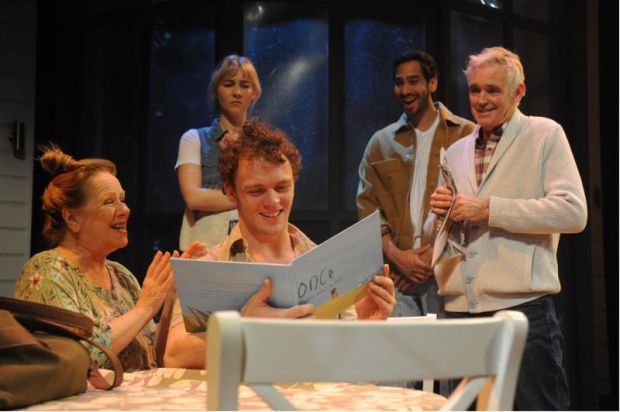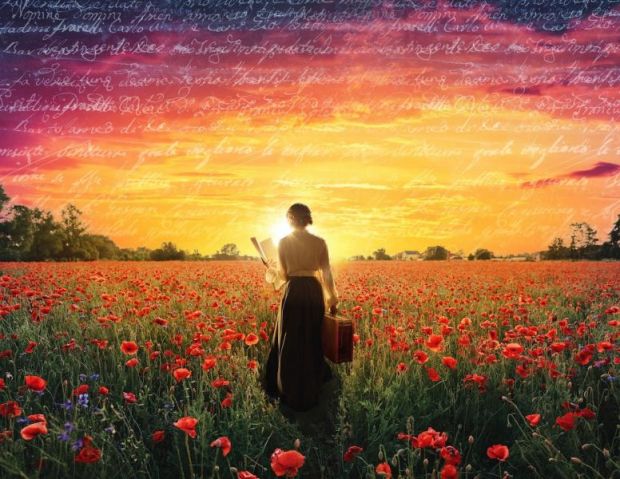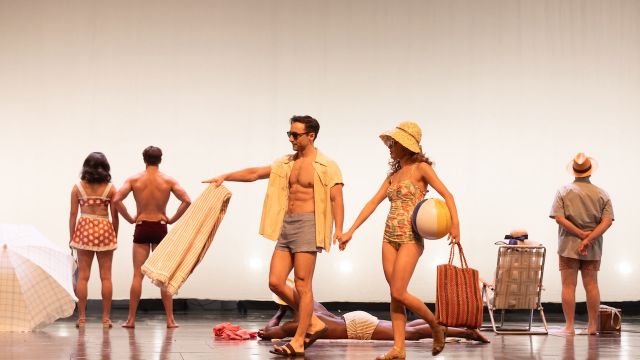Adapted for the Stage by ..
Three Australian world premiere productions, based on best-selling Australian novels, are due to open soon. Beth Keehn talks to the playwrights who have taken on their adaptation to the stage.
Nevil Shute’s apocalyptic novel On the Beach (1957) and Colleen McCullough’s first novel Tim (1974), about the relationship between an older woman and her handsome young gardener, have both made the leap to the screen twice, and are no strangers to adaptation, while Pip Williams’ best-selling debut novel The Dictionary of Lost Words (2020) is set to be adapted as a TV series. But how do you translate these much-loved, complex novels for the stage? I asked the playwrights who have undertaken this challenge - Tommy Murphy, Tim McGarry and Verity Laughton.
On the Beach
Based on the novel by Nevil Shute – adapted by Tommy Murphy.
Despite the imminent threat of a nuclear apocalypse, humans find hope, connections – and love.
I began my conversation with Tommy Murphy by asking: Why On the Beach, and why now?
I first read the book in 2018 and I did a very fast draft to get the stage adaptation ready for the 2020 season. Then the theatres closed. But now, the timing couldn’t feel more ideal – we want to process what we’ve all been through together – our shared global experience, and our resilience. I think our audience will bring that recent and ongoing memory to the theatre. And there are a lot of uncanny things that Nevil Shute predicts in his book that are eerily prophetic.

It really is a very beautiful story about humanity.…
I felt like this story wanted to be a play because of the remarkable characters. Four people come into each other’s constellation – they exchange parts of themselves and ways of seeing. And I think Nevil Shute also has something to say about Australia as a place that feels far away from the rest of the world. The character of Moira says it’s so unfair that Australia should bear the brunt of the wrongs of more powerful nations – a sentiment that people sometimes still feel.
The pandemic pause served the writing well .…
The writing process involved working with our director, Kip Williams, all the way along. Having the time away and coming back with a fresh perspective – that doesn’t usually happen. And working with actors in rehearsals is a lovely part of the process. I love the scrutiny that the actors bring, and the way they take charge of the characters and look at it in a different way.

Translating the novel’s settings – including a submarine, ocean, car race – to the stage.…
It’s my policy to write to the characters’ perspective and imagine the world as they would see it. I focus on what the characters are experiencing. I do have to keep in mind the parameters and my sense of what works well on stage. But I can write a stage direction knowing that this will inspire Kip and Michael Hankin, our set designer, to solve that problem and find a beautiful theatrical response to it.
Everything draws inspiration from the novel.…
Some adaptations require you to be very dutiful to the book. Some require you to preserve the experience of the novel. Others require you to invent something quite distinct from the original material. I think On the Beach sits somewhere in between. And, while the story remains set in 1963, it felt appropriate to alter some of the aspects – such as the gender relationships, and some storytelling techniques that don’t work well in a play. But I think that Shute’s message is simple: It’s not too late to change your ways. There is a call to action now in the context of climate change and the current feelings of brinkmanship we are feeling in global politics. Unfortunately, Shute’s call to action and sense of alarm is still necessary today.

This Sydney Theatre Company (STC) production played at the Roslyn Packer Theatre, Walsh Bay, from 18 July to 12 August.
Production images from On The Beach by Daniel Boud.
Tim
Based on the novel by Colleen McCullough – adapted by Tim McGarry.
Mary, a successful business executive, meets Tim, a young labourer with a mild intellectual disability. Their worlds collide, and their lives are changed dramatically.

I asked Tim McGarry why he wanted to revisit the novel Tim.
I always hope that the audience is going to come away understanding the world a little bit better than when they went into the theatre. I hope Tim helps people who live in a family with someone who has a disability – and I hope it makes people rethink ageism in relationships and society too.
Tim is a beautiful love story. But it is about relationships that might not fit the norm. Mary has to decide whether she’s going to move forward as a single woman or whether she is going to allow herself to love Tim. And I think that’s the journey of the play. We all deserve to live our best life. And we all deserve to love who we want to love without fear or favour.
The original novel and the play are two very different beasts.…
I read the novel several times, but I took Colleen’s story, became very familiar with it, and then I brought it into the modern day. The novel was very much of its time – the early 1970s – and so much has changed in the intervening 50 years. Language has changed enormously, particularly around disability, and of course the role of women in society. So, with the permission of the McCullough Estate, I’ve slightly changed the women’s roles and the storyline, so the play rings truer with today’s audiences.
But, I’ve kept the educational and class differences that exist between Tim and Mary. It’s been a joy bringing the dialogue into the modern day. And updating to modern Australia has also led me to recast the ethnicity of some characters. In the book, Mary goes to a friend at a school for children with disabilities – I have changed that to a group home where Tim meets Raj, the house manager, played by Akkshey Caplash, who is originally from India.

The other issue is around disability.…
For the last 32 years I’ve worked for people with disabilities in group homes, getting to know people who are going through what Tim and his family are experiencing. While many things have changed, many things haven’t. So that was my passion for doing the work.
Also, we all felt very strongly that the actor who plays Tim should a lived experience of a disability. We found a young actor, Ben Goss, who happens to have a disability. He is gobsmackingly fantastic and will be wonderful as Tim!
The journey from gaining permission to getting Tim on stage.
I contacted the Colleen McCullough Foundation in 2018 and they graciously gave me the rights in 2019. I was commissioned by the Art House in Wyong and the Capital Theatre in Tamworth to develop the script further and I’ve been tinkering with it ever since, including working with our director, Darren Yap.
As this is a new work, I will spend the first week of rehearsals with Darren and the actors, going through the script again. They will get up on the floor and then it’s time for me to walk away and leave them to develop the play! But I’m very close by to the theatre, so I can go back and tinker if needed.

Produced by Christine Dunstan Productions, Tim played at Glen Street Theatre, Belrose from 27–30 July, ahead of a regional NSW tour.
Production photos from Tim by Branco Gaica
The Dictionary of Lost Words
Based on the novel by Pip Williams – adapted by Verity Laughton.
As Esme’s father and his lexicographers compile the Oxford English Dictionary, she saves the words that are rejected, connecting us to women’s invisible social history.
I asked Verity Laughton what drew her to adapting The Dictionary of Lost Words to the stage.
I am very much a ‘words’ playwright and this novel is about words. It’s a beautiful opportunity as an adaptation – compressing a whole world – social history, social change – into this partly fictive, partly real discussion of the making of the Oxford English Dictionary. The conceptual framework of the book is very original – dealing with our linguistic and dialectic inheritance, and what’s been forced to remain invisible.

The South Australian connection was a bonus…
Mitchell Butel (Artistic Director of State Theatre Company South Australia), had read the book and approached the author, Pip Williams, about doing an adaptation. Mitchell asked me if I’d be interested in doing the stage adaptation – and I said YES with ungracious speed!
I was able to meet with Pip Williams – she lives in a little town in the Adelaide Hills where my grandparents lived. And the book includes characters who emigrate to Adelaide – which picks up the other major theme: the granting of women’s suffrage, which happens in Adelaide way before it happens in the UK.
When you’re writing, there’s a period when you are really hot. …
I did the bulk of the work quite soon after getting the commission, which was around 2021 – that’s when you really must write, when your intuition and your unconscious mind will feed into the script most strongly. Obviously there have been changes since, but the first draft included the structure – so once that works you are in a safe place.

The collaborative side is a lot of fun after working on your own. …
I like to be at the theatre for the first week or 10 days of rehearsal. I like to get the script as right as possible before we go into rehearsal, but inevitably things change when you are on the floor and you have the input of a terrific director like Jess and good actors. But also, it’s not finished until it’s in front of an audience and you’ve been able to calibrate their reactions.
The words are part of the story and moving the action forward. …
The novel contains many words and lots of letter-writing, and I wanted words to be featured and be part of the forward action – so Jonathon Oxlade, our designer will work to realise that in a physical way. I hope that this play gives the novel’s readers the experience that they have treasured in a present, three-dimensional way. There are so many wonderful characters. And, while parts of the story are quite sad, it is very funny, too – and I hope that comes through in the tone of the piece, and people will have a joyous night out at the theatre!
Co-produced by the State Theatre Company South Australia and Sydney Theatre Company, The Dictionary of Lost Words plays at the Dunstan Playhouse, Adelaide Festival Centre from 22 September to 14 October, then Sydney Opera House from 26 October to 9 December
Subscribe to our E-Newsletter, buy our latest print edition or find a Performing Arts book at Book Nook.

